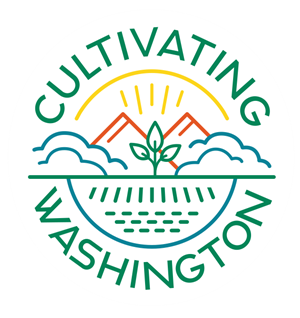Granges were an important political force through much of rural America through the first half of the twentieth century and were responsible for a number of progressive agricultural and political reforms. The Happy Valley Grange, located in Redmond on NE 50th Street (just south of Redmond Fall City Road at 196th Avenue NE) has a long and significant local history stretching back to 1909. This account of the Happy Valley Grange, prepared by Sammamish Heritage Society historian Phil Dougherty, is based on two interviews of grange member Lorraine Mills in 2003. It reprints Dougherty's article, "Happy Valley Grange Has a Long, Local History" (Sammamish Review, January 19, 2005, p. 20), and appears here with the kind permission of the Sammamish Heritage Society.
Happy Valley Grange
The National Grange first organized in 1867 in Washington, D.C., and from there granges extended into the states, counties, and eventually communities of what was then a primarily rural America. In Washington state the grange was first organized in LaCamas (later Camas) in September 1889.
In 1909, two men visited Happy Valley -- an area loosely defined as extending along the Redmond Fall City Road from about 196th Avenue NE to about 244th Avenue NE -- with the specific purpose of organizing a local grange. The first man was Ernest M. Smith, lecturer (in charge of grange educational and social aspects) of the Washington State Grange. The second man was Mr. Sims (his first name is apparently lost to history) from the Bothell Grange. These men were seeking to set up a local grange in Happy Valley, and went house-to-house canvassing residents. They found 20 people in their initial canvass who were interested in starting a grange in Happy Valley.
The Happy Valley Grange held its first organizational meeting on September 2, 1909, at the Happy Valley School House, located on property next to the present (2005) Happy Valley Grange Hall. There were 51 charter members, which likely represented a significant percentage of the population of Happy Valley and the surrounding area at that time. (Many of the last names on the early membership rosters are Scandinavian -- a testament to the early twentieth-century heritage of Happy Valley.) The grange took the official name of "Happy Valley Grange # 322" and quickly got down to work.
Grange membership was for adults 14 years and older. Most granges also had a "junior grange" for children ages 5 to 14, and Happy Valley's junior grange organized in 1921.
Soon after its inception, the Happy Valley Grange drafted a petition to King County and requested that the County build waiting rooms at the ferry docks on Lake Washington both in Kirkland and Madison Park in Seattle. Ferries were the only way to cross the lake at that time; the first bridge across Lake Washington would not be built until 1940. Copies of the petition were sent to all of the Eastside granges asking for their support. (Most communities on the Eastside had granges -- at one time there were 23 granges in King County alone.) Once the Eastside granges responded, the petition was submitted to the County in October 1909, and by December the ferry waiting rooms were under construction.
A few other early causes the Grangers supported as it grew during the 1910s included rural free delivery of mail and parcel post delivery. The Grange also supported woman suffrage -- and women won the right to vote in our state in 1910, 10 years before the 19th Amendment to the U.S. Constitution guaranteed the same right to all women in America.
In the 1920s the Grangers were active on the "Good Roads Committee" in Redmond. Good Roads was a widespread campaign during the 1920s to build paved highways for automobiles to replace the dirt roads that had been used just a few years earlier by the horse and buggy. During the 1920s and especially into the 1930s, the Grange also worked to bring electricity into the Happy Valley Community.
One of the Happy Valley Grange's signature accomplishments came in 1935 when it teamed up with the State Grange and got legislation passed that established the blanket primary in Washington State. This was Washington's primary system until 2003, when a federal appeals court in San Francisco struck it down.
The Happy Valley Grange continued to be active in the years after the end of the World War II in 1945. The grange participated in numerous community events, fairs, and parades into the 1970s, and was a significant community social center as well. The Grange also provided a wide range of community services, including Grange Insurance.
Much of the focus of the Grange's work over the years has been directed toward agricultural issues that have a particular impact on rural communities. Two examples include the Grange's support in passing a state law for pure feed for livestock and its support of the cooperative movement for selling and buying farms supplies and produce.
Membership in the Happy Valley Grange peaked around 1970 and though membership has declined in recent years, the Grange continues to remain politically active. In 2003 the Grange drafted a resolution to support dredging area rivers to improve salmon spawning and also improve flood control in flood-prone areas. The Grange also supports the Pacific Legal Foundation, an organization of lawyers who work to protect private property rights.
Lorraine Mills, a Happy Valley Grange member since 1940, succinctly summed up the Grange's philosophy in a 2003 interview: "Our grange motto is 'The greatest good to the greatest number' and we try to follow that credo" (interview).
Note: This article is part of Cultivating Washington, The History of Our State’s Food, Land, and People, which includes more agriculture-related content, vidoes, and curriculum.

